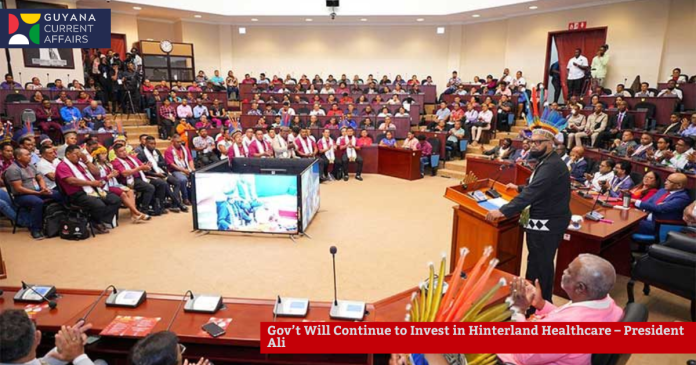President Irfaan Ali has reaffirmed his administration’s commitment to expanding and strengthening healthcare services across Guyana’s hinterland, promising continued investment to ensure that remote and Indigenous communities receive quality medical care.
Speaking at the opening of the 2025 National Toshaos Council Conference, President Ali highlighted the transformative progress made in the country’s hinterland regions since 2020. He emphasized that these advancements are not temporary or opportunistic, but part of a sustained effort to uplift communities that have long been underserved.
The President pointed to a dramatic increase in healthcare infrastructure, personnel, and services in Regions One, Seven, Eight, and Nine. In Region One, for example, the number of trained healthcare professionals has grown from fewer than 60 between 2015 and 2020 to over 330 since 2020. The region now boasts 56 vaccination sites, 17 telemedicine centers, and a significant boost in transportation resources, including ambulances, all-terrain vehicles, and boats for medical outreach and emergencies.
Similar progress has been recorded in Region Seven, where billions of dollars have been invested, 45 new vehicles have been added to the healthcare fleet, and 43 new community health workers have been trained. Medical outreaches and access to essential medicines have also increased substantially.
Region Nine has seen a sharp decline in the need to transfer patients out of the region for critical care, thanks to expanded services and the training of over 550 healthcare workers. Surgeries that were once unavailable are now routinely performed, and the Lethem Hospital has become a destination for patients from neighboring Brazil.
In Region Eight, annual health outreaches and training programs have been ramped up, with the region recording its first elective surgeries and a significant rise in the availability of medical supplies and medicines.
President Ali announced plans to further upgrade health centers to polyclinics, complete new hospitals, implement electronic health record systems, and expand transportation and accommodation for medical staff. He also underscored the government’s goal to eliminate malaria in the hinterland by 2030 and to ensure that every village has access to modern healthcare.
“These are not just numbers; these are lives changed and communities empowered,” President Ali said. “We will continue to invest in the health and well-being of our hinterland citizens, ensuring that no one is left behind as Guyana moves forward.”
The President’s pledge was welcomed by Indigenous leaders and residents, who have long advocated for greater equity in healthcare access. As the government continues to roll out new initiatives and infrastructure, the focus remains on building a resilient, inclusive healthcare system that serves all Guyanese, regardless of geography.


